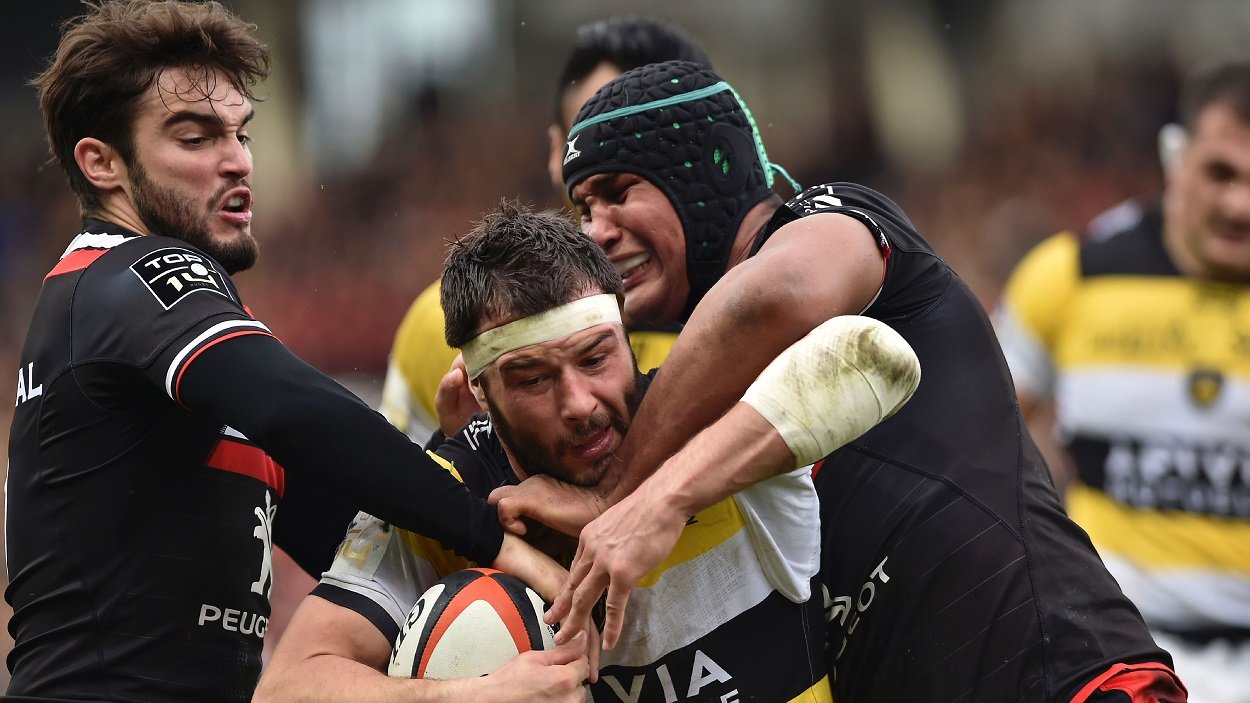Toulouse 'to adopt two-doctor approach to HIAs' after Palisson incident

An ‘independent’ doctor will assist Toulouse’s medical personnel in treating any future head injury cases, the club has said in response mounting pressure over the treatment of Alexis Palisson during last weekend’s Top 14 match against La Rochelle at Stade Ernest Wallon.
Palisson left the pitch after this collision with La Rochelle’s Levani Botai in the 13th minute of last weekend’s game
https://twitter.com/greub1/status/838422731012059137
left him, temporarily, like this
– Le protocole est bon, on va relancer Alexis.
Y'a plus de respect. https://t.co/OTMEkPu0tX— David Arrieta (@arrietadavid1) March 5, 2017
Six minutes later, however, Palisson returned to finish the game, having apparently passed a Head Injury Assessment (HIA).
Two days after the match, Bernard Laporte’s enforcer at the FFR, Serge Simon – a doctor, former player and one-time president of the French players’ union – described the incident as ‘scandalous’.
The Palisson case is unacceptable in modern rugby,” Simon told France’s RMC Sport. “It’s scandalous that a player had a blatant and unmistakable concussion … yet he returned to the field of play.”
“We know today the dangers of repeated concussions … How did Palisson stay on the field?
An investigation will be launched into all aspects of the incident, including the actions of match officials and club staff, he said, adding: “In this day and age, it is no longer possible to make things better with a magic sponge,” he said.
In a statement released on Friday, five days after the incident, Toulouse insisted player welfare was its primary concern, and that it had properly complied with the Ligue National de Rugby’s concussion protocol directives.
But, it added, the club doctor did not see the collision; nor did he see Palisson stagger and stumble into an assistant referee immediately afterwards.
Stade Ernest Wallon is equipped with a number of giant screens on which a live feed from French Top 14 broadcaster Canal Plus is routinely broadcast, including instant highlights of key moments.
Toulouse’s statement added the winger passed an HIA before returning to the pitch. It did not say whether the medical approach would have been different if the doctor had seen what unfolded on the pitch before Palisson was helped off for assessment, but the implication is that Palisson would have received attention in line with World Rugby protocols had medical staff been fully aware of what happened.
Those protocols state that any player displaying clear or suspected signs of loss of consciousness should be permanently and immediately removed from the field of play.
– Le protocole est bon, on va relancer Alexis.
Y'a plus de respect. https://t.co/OTMEkPu0tX— David Arrieta (@arrietadavid1) March 5, 2017
In such cases, no HIA should take place.
From now on, medical staff on match days will have access to a handheld tablet device on which to review action from the game, the statement continued.
Furthermore, it added, a doctor ‘from outside the club will assist the club doctor’ in the treatment of head injuries and the management of concussion protocols at Toulouse matches both at home and away.
The relationship between the club’s medical staff and the independent doctor remains unknown, including what may happen in the case of any disagreement over player management in cases of head injuries.
Finally, Toulouse insisted in the statement that all injuries of this type have always been examined with the utmost attention and protocols have been widely observed.
The player, meanwhile, has defended the club. “I remembered everything and had a normal discussion with the doctor in the corridor. I told him everything, and it was as if nothing had happened. I did the balance test … and I passed. I was fine.”
“I have total confidence in our doctor and a tremendous respect for his work. He did not see me fall, maybe it was a small mistake, but if someone took a risk, it was me because I did not tell him to lose the balance, not him.”
He will miss Toulouse’s trip to Brive this weekend, but is confident that he will return to normal training ‘on Monday’.
































































